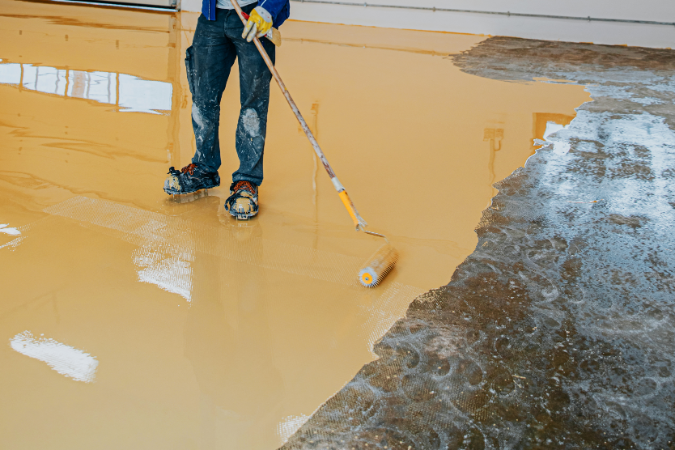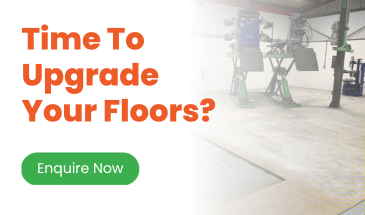When a business is looking for a hard-wearing, no-nonsense commercial flooring solution, there is normally only one option that comes to mind – concrete. Concrete flooring is renowned for its strength and allows businesses to lay down a tough and damage-resistant floor for a modest cost over large surface areas. However, concrete isn’t without its drawbacks, and a growing number of businesses are now turning to epoxy resin screed flooring as an alternative to traditional concrete. In this article, we’ll explore the main differences between concrete and epoxy resin screed flooring to help you determine the best option for your needs.
What Is Epoxy Floor Screed?
Epoxy floor screed is a type of flooring system consisting of an epoxy resin mixed with a hardener and then applied to a floor surface, or base layer. In material terms, epoxy is very different to concrete. Concrete is an admixture of water, cement – which is the binder that holds the other components together – and various aggregates, which can include sand, gravel, crushed stone, or other granular materials, and makes up the bulk of the concrete’s volume. Epoxy screed, on the other hand, is a thermosetting polymer made from a reaction between two principal components – epoxide resin and a polyamine hardener. It is the reaction between the two compounds that create the durable, seamless surface characteristic of epoxy floor screeds, and is the key to what makes epoxy such a popular choice for commercial and industrial settings.
Resin Vs Concrete
There are significant differences between concrete and epoxy resin screed when it comes to flooring.
Price: Epoxy resin flooring is often more pricey than regular concrete flooring, but in terms of lifetime cost of ownership, an epoxy screed may well be more cost-effective, as it is more durable and needs less upkeep. The higher installation cost is due to both the materials used and the labour and skill involved in application. Conversely, concrete floors are comparatively cheap to install, but you’ll need to budget more long-term for maintenance and repairs.
Durability: Both epoxy and concrete floors are durable and chemical resistant, but epoxy provides a more effective long-term protective coating for your existing flooring materials, enhancing its longevity. Concrete flooring requires regular maintenance and upkeep to sustain performance, and is easily damaged by temperature fluctuations, impacts, and chemical and acid spills.
Installation time: Epoxy floors are generally faster to install than concrete, and the application itself can often be completed within a day or two. However, the screed must be allowed sufficient time to cure completely before it can be used – which can take 3 to 7 days in many cases.
Thickness: Self-levelling (poured) epoxy flooring systems are usually applied between 1 mm to 3 mm in thickness, delivering a smooth and level finish, while trowel applied systems are typically applied between 4 mm and 6 mm. Concrete floors are usually significantly thicker, requiring a depth of 10 to 15 cm in many commercial applications.
Hygiene: Although both concrete and epoxy screeds can be used for hygienic flooring systems, screed is easier to keep clean and is therefore more sanitary than concrete.
Resin Flooring Vs Polished Concrete
Implementing a resin flooring solution on your premises does not necessarily mean ditching concrete altogether. Many businesses use an epoxy resin screed as a finishing layer over an existing concrete base to provide a smooth and level surface, as an alternative to polished concrete. Epoxy screed can also be used under a high-performance top flooring level, such as vinyl. This is because epoxy screed eliminates bumps and cracks in the base flooring, whereas a concrete base can be rough and split over time.
When Is Concrete A Better Option?
Despite the wide-ranging advantages of epoxy resin screed, there are some situations in which concrete flooring may be a better option. These include heavy industrial environments that experience wide temperature variations, and industrial applications where there is constant heavy machinery and high traffic. In these extreme cases, a concrete flooring solution may be better suited to withstand the weight of heavy plant and equipment, whereas most epoxy resin screeds are not designed to bear the same load capacity.
Request A Quote
Epoxy resin screed is an affordable and low maintenance flooring solution for a wide range of light to moderate industrial applications. To find out more about our resin flooring solutions and how they compare with traditional concrete flooring, or to request a quote, please contact one of our knowledgeable team by clicking here.
Image Source: Canva




